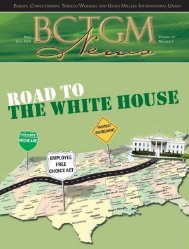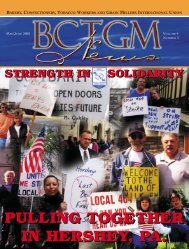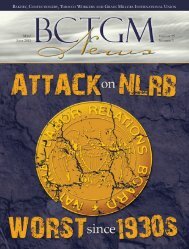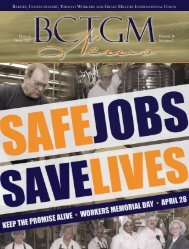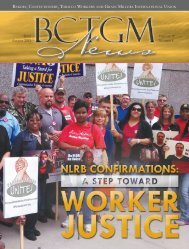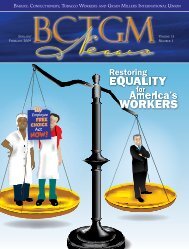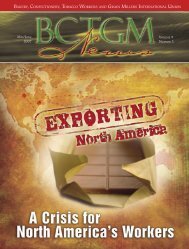to view/print. - Bakery, Confectionery, Tobacco Workers and Grain ...
to view/print. - Bakery, Confectionery, Tobacco Workers and Grain ...
to view/print. - Bakery, Confectionery, Tobacco Workers and Grain ...
You also want an ePaper? Increase the reach of your titles
YUMPU automatically turns print PDFs into web optimized ePapers that Google loves.
100 Years Young: Local 114<br />
Celebrates a His<strong>to</strong>ry of Activism<br />
AAfter 100 years of defending the<br />
rights of bakery workers in the<br />
Pacific Northwest, BCTGM Local<br />
114 (Portl<strong>and</strong>, Ore.) shows no<br />
signs of slowing down. On<br />
August 27, the local celebrated<br />
its 100th anniversary with the<br />
same energy <strong>and</strong> devotion that<br />
the founding members of the<br />
union displayed, according <strong>to</strong><br />
Local 114 Financial Secretary-<br />
Treasurer Laurel Koch.<br />
“It’s amazing how a lot of the<br />
issues that this union fought for<br />
100 years ago—better<br />
wages, hours <strong>and</strong> working<br />
conditions—are the<br />
same issues we fight for<br />
<strong>to</strong>day. On that level, not<br />
much has changed,”<br />
said Koch.<br />
Koch <strong>and</strong> a team of<br />
volunteers spent months<br />
researching the his<strong>to</strong>ry<br />
of the union for a booklet<br />
that was given <strong>to</strong><br />
Local 114 members in<br />
honor of the local’s 100-<br />
year anniversary. The<br />
research team consisted<br />
of Koch, members<br />
Nancy Milner, Sharon<br />
Graham, Georgene<br />
Barragan, <strong>and</strong> her<br />
daughter, Erin.<br />
The local began with members<br />
at just 15 retail shops.<br />
Today, Local 114 represents more<br />
than 1,140 workers at some 160<br />
retail <strong>and</strong> wholesale bakeries—<br />
most of the wholesale bakeries in<br />
the Portl<strong>and</strong> metropolitan area<br />
under union contract.<br />
“In March of 1904, union<br />
label bread was seen for the first<br />
time. A committee had been<br />
appointed <strong>to</strong> visit various retail<br />
s<strong>to</strong>res <strong>and</strong> request the managers<br />
<strong>to</strong> buy no bread unless it has the<br />
seal of organized labor stamped<br />
upon its side,” writes the<br />
research team in the Bakers<br />
Union Local 114 His<strong>to</strong>ry.<br />
The fight of the Bakers Union<br />
in 1904 was borne directly upon<br />
the health <strong>and</strong> welfare of the<br />
home. The bakers fight was <strong>to</strong><br />
give families bread, cake <strong>and</strong><br />
pies prepared under sanitary<br />
conditions. “The Union Label<br />
Local 114 Bus. Agt. Gene Beaudoin (left) Fin.<br />
Secy. Laurel Koch (center) <strong>and</strong> member<br />
Georgene Barragan display a pho<strong>to</strong> of the Local<br />
114 “Knights of Peel” in the 1919 Labor Day<br />
parade in Portl<strong>and</strong>.<br />
was a guarantee that your bakery<br />
products were prepared in<br />
wholesome, clean, well-ventilated<br />
shops from materials that<br />
were free from poisons <strong>and</strong> adulterants,”<br />
notes Koch.<br />
“Local 114 even required a<br />
medical exam for members <strong>to</strong><br />
make sure they were free of<br />
tuberculosis or other contagious<br />
diseases. The Union Label s<strong>to</strong>od<br />
not only for quality but also<br />
cleanliness,” Koch recalls.<br />
By 1912, Local 114 had been<br />
so adamant about the sanitary<br />
conditions of its shops, Portl<strong>and</strong><br />
could now boast of having the<br />
most sanitary union bakeries in<br />
the United States. Local 114<br />
helped bakers win a 35-hour<br />
workweek. At the time, bakers<br />
worked for 16 hours a day, six<br />
days a week. Later, in the mid-<br />
1950s, the local was able <strong>to</strong><br />
secure employer-paid pensions<br />
<strong>and</strong> language protecting<br />
members from the effects<br />
of mechanization. Koch<br />
also discovered language<br />
in an early contract that<br />
called on employers “<strong>to</strong><br />
pay girls the same wage as<br />
the men they replaced.”<br />
“Local 114 s<strong>to</strong>od strong<br />
<strong>and</strong> survived, several<br />
times coming very close <strong>to</strong><br />
being put out of business<br />
by anti-union forces,”<br />
Koch recalls. “It is simply<br />
amazing that we continue<br />
<strong>to</strong> fight for the same things<br />
<strong>to</strong>day that we’ve fought<br />
hard <strong>and</strong> won in the past.<br />
His<strong>to</strong>ry is a revolving<br />
door—a different angle but<br />
the same issues.<br />
“Throughout our his<strong>to</strong>ry, we<br />
have grown in strength <strong>and</strong> in<br />
numbers. There is no doubt that<br />
this local union will continue <strong>to</strong><br />
add a wealth of his<strong>to</strong>ry <strong>and</strong> color<br />
<strong>to</strong> the books of the BCTGM for<br />
many years <strong>to</strong> come,” concludes<br />
Koch, who retirees later this year<br />
after more than 22 years as a<br />
Local 114 officer <strong>and</strong> 36 years in<br />
the baking industry.<br />
September/Oc<strong>to</strong>ber 2004 www.bctgm.org 5



